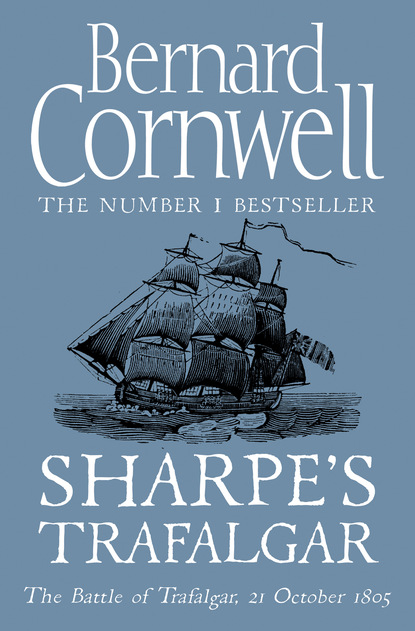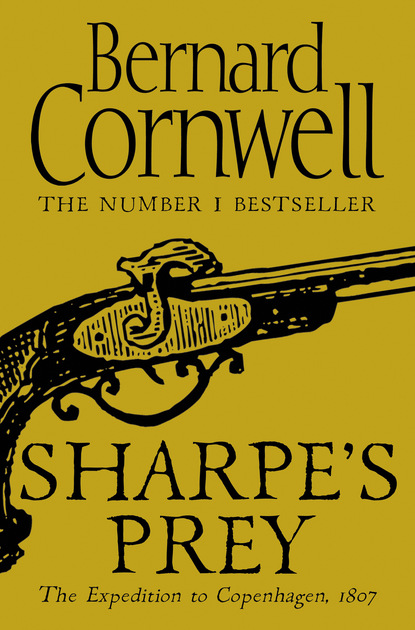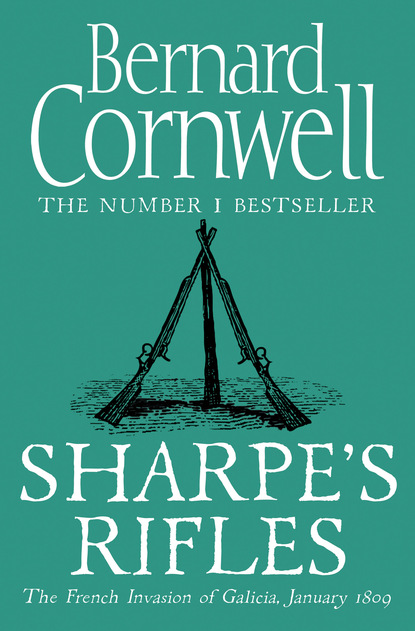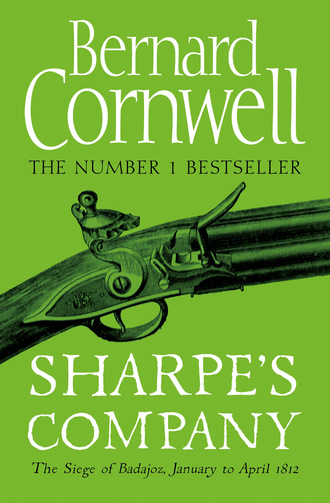
Полная версия
The Sharpe Series

SHARPE’S
COMPANY
Richard Sharpe and the Siege of Badajoz,
January to April 1812
BERNARD CORNWELL

Copyright

An imprint of HarperCollinsPublishers
1 London Bridge Street
London SE1 9GF
www.harpercollins.co.uk
First published in Great Britain by Collins 1982
Previously published in paperback by Fontana 1983
Reprinted eleven times
Copyright © Rifleman Productions Ltd 1982
Cover design by Holly Macdonald © HarperCollinsPublishers Ltd 2019
Cover image © Private Collection/Bridgeman Images
Bernard Cornwell asserts the moral right to be identified as the author of this work
A catalogue record for this book is available from the British Library
This novel is entirely a work of fiction. The names, characters and incidents portrayed in it are the work of the author’s imagination. Any resemblance to actual persons, living or dead, events or localities is entirely coincidental.
All rights reserved under International and Pan-American Copyright Conventions. By payment of the required fees, you have been granted the non-exclusive, non-transferable right to access and read the text of this ebook on-screen. No part of this text may be reproduced, transmitted, downloaded, decompiled, reverse engineered, or stored in or introduced into any information storage and retrieval system, in any form or by any means, whether electronic or mechanical, now known or hereinafter invented, without the express written permission of HarperCollins.
Ebook Edition © July 2009 ISBN: 9780007334551
Version: 2019-12-13
Sharpe’s Company is for the Harper family, Charlie and Marie, Patrick, Donna and Terry, with affection and gratitude
‘Brilliant! Sharpe is a great creation’
Daily Mirror
‘Now thou art come unto a feast of death’
WILLIAM SHAKESPEARE
HENRY VI, PART I, ACT 4, SCENE 5.
Contents
Cover
Title Page
Copyright
Dedication
Epigraph
Map
Part One: January 1812
Chapter One
Chapter Two
Chapter Three
Chapter Four
Chapter Five
Chapter Six
Chapter Seven
Part Two: February–March 1812
Chapter Eight
Chapter Nine
Chapter Ten
Chapter Eleven
Part Three: St Patrick’s Day, March 17th to Easter Sunday, March 29th 1812
Chapter Twelve
Chapter Thirteen
Chapter Fourteen
Chapter Fifteen
Chapter Sixteen
Chapter Seventeen
Chapter Eighteen
Chapter Nineteen
Chapter Twenty
Part Four: Saturday, April 4th to Monday, April 6th 1812
Chapter Twenty-One
Chapter Twenty-Two
Chapter Twenty-Three
Chapter Twenty-Four
Chapter Twenty-Five
Chapter Twenty-Six
Chapter Twenty-Seven
Chapter Twenty-Eight
Chapter Twenty-Nine
Epilogue
Historical Note
Sharpe’s Story
Keep Reading …
About the Author
The SHARPE Series (in chronological order)
The SHARPE Series (in order of publication)
Also by Bernard Cornwell
About the Publisher
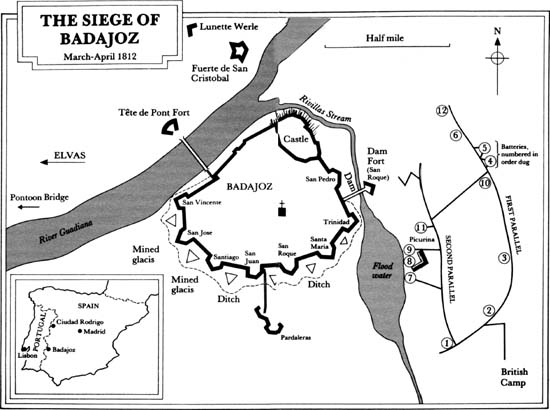
CHAPTER ONE

A pale horse seen a mile away at sunrise means the night is over. Sentries can relax, battalions stand down, because the moment for a surprise dawn attack has passed.
But not on this day. A grey horse would hardly have been visible at a hundred paces, let alone a mile, and the dawn was shredded with dirty cannon smoke that melded with the snow-clouds. Only one living thing moved in the grey space between the British and French lines; a small, dark bird that hopped busily in the snow. Captain Richard Sharpe, huddled in his greatcoat, watched the bird and willed it to fly away. Move, you bastard! Fly! He hated the superstition in himself. He had spotted the tiny bird and, quite suddenly and unbidden, the thought had come to him that unless the bird took wing within thirty seconds, then the day would end in disaster.
He counted. Nineteen, twenty, and still the damned bird hopped in the snow. He could not tell what kind of bird it was. Sergeant Harper would know, of course, the huge Irish sergeant knew all the birds, but knowing what kind of bird it was would not help. Move! Twenty-four, twenty-five, and in desperation he bundled a crude snowball and skittered it down the slope so that the small bird, startled, sprang up into the skeins of smoke with a couple of seconds to spare. A man must sometimes make his own luck.
God! But it was cold! It was all right for the French. They were behind the vast defences of Ciudad Rodrigo, sheltered in the town’s houses and warmed by wide hearths, but the British and Portuguese troops were in the open. They slept by vast fires that died in the night and yesterday, at dawn, four Portuguese sentries had been discovered frozen, their greatcoats iced to the ground, dead by the river. Someone had tipped them in, breaking the Agueda’s thin ice, because no one wanted to dig graves. The army had taken its fill of digging; for twelve days they had done nothing else; batteries, parallels, saps and trenches, and they never wanted to dig again. They wanted to fight. They wanted to carry their long bayonets up the glacis of Ciudad Rodrigo, to go into the breach, to kill the French, and take those fires and houses for themselves. They wanted to be warm.
Sharpe, Captain of the South Essex’s Light Company, lay in the snow and stared through his telescope at the largest breach. He could not see much. Even from the hillside, five hundred yards from the town, the snow-covered slope of the glacis hid all but the top few feet of Ciudad Rodrigo’s main wall. He could see that the British guns had done damage and knew that the stones and rubble must have cascaded into the hidden ditch to make a crude ramp, perhaps a hundred feet wide, up which the attackers must climb to get into the heart of the fortress town. He wished he could see beyond the breach to the alleyways at the foot of the shot-scarred church tower that was so close to the walls. The French would be busy there, building new defences, siting fresh cannon, so that when the attack burst over the rubbled mound of the breach it would be met with precisely planned horror, flame and grapeshot, death in the night.
Sharpe was afraid.
It was a strange knowledge, known to him alone, and he was ashamed of it. It was not certain that the attack would be on this day, but the army, with the instinct of men who know that the time has come, were confident that Wellington would order the assault this night. No one knew which battalions would be chosen, but whichever units were to brave the assault they would not be the first attackers to climb the breach. That was a job only for volunteers, the ‘Forlorn Hope’, whose suicidal task was to draw the defenders’ fire, force them to spring their carefully prepared traps, and clear a bloody path for the battalions that followed. Not many of the Forlorn Hope would live. The Lieutenant who commanded, if he was still alive, would receive his Captaincy on the spot and his two Sergeants would be made Ensigns. The promises of promotion were easily given because they rarely had to be kept, yet there was never a shortage of volunteers.
The Forlorn Hope was for the brave. It may have been a courage born of desperation, or foolhardiness, but it was courage just the same. Men who survived a Hope were marked for life, famous among their comrades, envied by lesser men. Only the Rifle Regiments gave a badge to the survivors, a laurel-wreath that was sewn to the sleeve, but Sharpe did not hanker after medals. He simply wanted to survive a test, the supreme test of almost certain death because he had never been in a Forlorn Hope. It was a foolish desire, and he knew it, but it was there.
It was not just a test. Richard Sharpe wanted the promotion. He had joined the army at sixteen, as a Private, and worked his way through the ranks until he was a Sergeant. On the battlefield of Assaye he had saved the life of Sir Arthur Wellesley and had been rewarded with the telescope and a commission. Ensign Sharpe risen from the gutter, but still ambitious, still needed to prove, day after day, that he was a better soldier than the privileged sons who purchased their promotions and climbed the officers’ ladder with monied ease: Ensign Sharpe became Lieutenant Sharpe and, wearing a new uniform, the dark green of the 95th Rifles, he fought his way through Northern Spain and Portugal; the Corunna retreat, Rolica, Vimiero, the Douro crossing, and Talavera. He had taken the French Eagle at Talavera when he and Sergeant Harper had hacked their way into an enemy battalion, cut down the standard bearer, and brought the trophy back to Wellesley. He became the Viscount Wellington of Talavera. And Sharpe had been gazetted, just before the battle, as a Captain. It was the promotion he most wanted; the chance to lead his own Company, but the gazette was now two and a half years old and it was still unapproved.
He could hardly believe it. In July he had gone back to England and spent the last six months of 1811 recruiting in London and the Shires for the shrinking South Essex Regiment. He had been feted in London, dined by the Patriotic Fund, and presented with a fifty-guinea sword for the capture of the French Eagle. The Morning Chronicle had dubbed him ‘the scarred Hero of the Field of Talavera’ and suddenly, for a few days at least, everyone had wanted to meet the tall, dark-haired Rifleman with the scar that gave his face an unnatural, mocking expression. He had felt out of place in the draped softness of London’s drawing rooms and had covered his discomfort by shrinking into silent watchfulness. The reticence had been thought dangerously attractive by his hostesses who had kept their daughters upstairs and the Rifle Captain to themselves.
But the Hero of the Field of Talavera was nothing but a nuisance to the Army Headquarters in the Horse Guards. It had been a mistake, a stupid mistake, but he had visited Whitehall and been shown to a bare waiting room. The autumn rain had spattered through a high, broken window as he sat, his huge sword across his knees, while a clerk with smallpox scars tried to find what had happened to the gazette. Sharpe simply wanted to know whether he was a real Captain, sanctioned as such by the Horse Guards’ approval, or merely a Lieutenant in borrowed and temporary rank. The clerk had kept him waiting three hours, but at last returned to the room. ‘Sharpe? With an “e”?’
Sharpe nodded. Around him a group of half-pay officers, sick, lame or half-blind, listened curiously. They were all seeking appointments and hoping Sharpe would be disappointed. The clerk blew dust off the papers in his hand.
‘It’s irregular.’ He peered at Sharpe’s dark green jacket. ‘You said the South Essex Regiment?’
‘Yes.’
‘But that, if I’m not mistaken, and I rarely am, is the uniform of the 95th?’ The clerk gave a small, self-satisfied laugh, as if in celebration of a small victory. Sharpe said nothing. He wore the uniform of the Rifles because he was proud of his old Regiment, because the job with the South Essex was only ever intended as a temporary attachment, and how was he to tell this pinched bureaucrat about leading his small band of Riflemen from the horrors of the Corunna retreat down to join the army in Portugal where they had been arbitrarily joined to the redcoats of the South Essex. The clerk twitched his nose and sniffed. ‘Irregular, Mr Sharpe, very irregular.’ He selected the top piece of paper with ink-stained fingers. ‘This is the document.’
He held Sharpe’s gazette as if the document might reinfect him with smallpox. ‘You were given a Captaincy in 1809?’
‘By Lord Wellington.’
The name cut no ice in Whitehall. ‘Who should have known better. Dear me, Mr Sharpe, he should have known better! It’s irregular.’
‘But not unknown, surely?’ Sharpe had suppressed his urge to vent his irritation on the clerk. ‘I thought it was your job to approve these documents.’
‘Or disapprove them!’ The clerk laughed again and the half-pay officers grinned. ‘Disapprove, Mr Sharpe, or disapprove!’ Rain fell down the chimney and hissed on the meagre coal fire. The clerk, his thin shoulders heaving with silent laughter, tugged a pair of spectacles from the recesses of his clothing and clipped them on to his nose as if the gazette, seen through smeared glass, might reveal new cause for merriment. ‘We disapprove them, sir, most of the time. You allow one and you allow all. It upsets the system, you know. There are rules, regulations, standing orders!’ And the clerk shook his head because it was obvious Sharpe understood nothing of the army.
Sharpe waited for the head-shaking to cease. ‘It seems to have taken you a long time to make any decision on this gazette.’
‘And still not made!’ The clerk said it proudly, making it seem that the length of time proved the gravity of the Horse Guards’ wisdom. Then he seemed to relent and offered Sharpe a rueful smile. ‘The truth is, Mr Sharpe, that there was a mistake. A regrettable mistake and your visit has happily rectified the mistake.’ He peered over his glasses at the tall Rifleman. ‘We are really most grateful to you for drawing it to our attention.’
‘Mistake?’
‘It was filed wrongly.’ The clerk plucked another piece of paper from his left hand. ‘Under Lieutenant Robert Sharp, no “e”, who died of the fever in 1810. His papers were, otherwise, in perfect order.’
‘Which mine are not?’
‘Indeed, no, but you are still alive.’ The clerk looked peevishly at Sharpe. ‘We do a have a chance of tidying up when an officer is translated to glory.’ He took off his glasses and cleaned them with Sharpe’s folded gazette. ‘It will be attended to, Mr Sharpe, with expedition. I promise you. With expedition!’
‘Soon?’
‘That’s what I said, isn’t it? It would be wrong to say more.’ The clerk pushed his spectacles back into place. ‘Now, if you’ll pardon me, there is a war on and I have other duties!’
It had been a mistake, Sharpe realized afterwards, to visit Whitehall, but it was done and he could only go on waiting. Surely, he told himself a dozen times each day, they could not disapprove the gazette. Not after he had taken the Eagle? After he had brought the gold out of the burning Almeida, and after he had savaged the finest French troops in the deathtraps of Fuentes de Oñoro? He stared gloomily across the snow at the scar in Ciudad Rodrigo’s defences. He knew he should have volunteered for the Forlorn Hope. If he had led it, and survived, then no one could have denied him the Captaincy. He would have proved himself, captured the rank, and the pox-scarred bureaucrats of Whitehall could scratch themselves into a well-ordered eternity because nothing they could do, nothing, could have taken the Captaincy away from him. A pox on the bloody lot of them!
‘Richard Sharpe!’ A quiet voice behind him, full of pleasure, and Sharpe twisted round.
‘Sir!’
‘I could feel a pricking in my thumbs! I knew you had to be back with the army.’ Major Michael Hogan slithered on the snow towards him. ‘How are you?’
‘I’m well.’ Sharpe scrambled to his feet. He beat the snow off his greatcoat and shook Hogan’s gloved hand.
The Engineer laughed at him. ‘You look like a drowned tinker, so you do, but it’s good to see you.’ The Irish voice was rich and warm. ‘And how was England?’
‘Cold and wet.’
‘Ah well, it’s a Protestant country.’ Hogan conveniently ignored the freezing dampness of the Spanish countryside around them. ‘And how is Sergeant Harper? Did he enjoy England?’
‘He did, and most of what he enjoyed was plump and giggled.’
Hogan laughed. ‘A man of sense. You will give him my best wishes?’
‘I will.’ The two men stared at the town. The British siege guns, long, iron twenty-four-pounders, were still firing, their reports muffled by the snow, and their shots erupting flurries of snow and stone from the walls either side of the main breach. Sharpe glanced at Hogan. ‘Is it a secret we’re attacking tonight?’
‘It is a secret. Everyone knows, of course, they always do. Even before the General. Rumour has it for seven o’clock.’
‘And does rumour extend to the South Essex?’
Hogan shook his head; he was attached to Wellington’s staff and knew what was being planned. ‘No, but I was hoping I could persuade your Colonel to lend me your Company.’
‘Mine?’ Sharpe was pleased. ‘Why?’
‘Not for much. I don’t want you lads in the breach, but the Engineers are short-handed, as ever, and there’s a heap of stuff to be carried up the glacis. Would you be happy?’
‘Of course.’ Sharpe wondered whether to tell Hogan of his wish that he had gone with the Forlorn Hope, but he knew that the Irish Engineer would think he was mad, so he said nothing. Instead he lent Hogan his telescope and waited silently as the Engineer stared at the breach. Hogan grunted. ‘It’s practical.’
‘You’re sure?’ Sharpe took the glass back, his fingers instinctively feeling for the inlet brass plate; ‘In Gratitude. AW. 23 September 1803’.
‘We’re never sure. But I can’t see it getting any better.’ The Engineers had the job of pronouncing when a breach was ‘practical’, when, in their judgment, the rubble slope could be climbed by the attacking infantry. Sharpe looked at the small, middle-aged Major.
‘You don’t sound very happy.’
‘Of course not. No one likes a siege.’ Hogan was trying, like Sharpe earlier, to imagine what horrors the French had prepared in the breach. A siege, in theory, was the most scientific of all fighting. The attackers battered holes in the defence and both sides knew when the breaches were practical, but the advantage was all with the defenders. They knew where the main attack was coming, when, and roughly how many men could be fed into the breach. There the science stopped. There was great skill needed to site the batteries, in sapping forward, but once the science of the Engineers had opened up the breach, it was left to the infantry to climb the defences and die on the rubble. The siege guns did what they could. They would fire till the last moment, as they were firing now, but soon the bayonets would take over and only raw anger would take the attackers through the prepared horror. Sharpe felt again the fear of going into a breach.
The Irishman seemed to sense his thoughts. He clapped Sharpe on the shoulder. ‘I’ve a feeling about this one, Richard. It’s going to be all right.’ He changed the subject. ‘Have you heard from your woman?’
‘Which one?’
Hogan snorted. ‘Which one! Teresa, of course.’
Sharpe shook his head. ‘Not for sixteen months. I don’t know where she’s been.’ Or even, he thought, if she was still alive. She fought the French in the ‘Guerrilla’, the ‘little war’, and the hills and rocks of her battles were not far from Ciudad Rodrigo. He had not seen her since they parted below Almeida and, thinking of her, he felt a sudden longing inside him. She had the face of a hawk, slim and cruel, with dark hair and eyes. Teresa was beautiful as a fine sword was beautiful; slim and hard.
Then, in England, he had met Jane Gibbons whose brother, Lieutenant Christian Gibbons, had tried to kill him at Talavera. Gibbons had died. Jane Gibbons was beautiful as men dream of beauty; blonde and feminine, slim as Teresa was slim, but there the resemblance ended. The Spanish girl could strip a Baker rifle lock in thirty seconds, could kill a man at two hundred paces, could lay an ambush and knew how to give a captured Frenchman a lingering death as payment for her own mother’s rape and murder. Jane Gibbons could play the pianoforte, write a pretty letter, knew how to use a fan at a county dance, and took her delight in spending money at Chelmsford’s milliners. They were as different from each other as steel is from silk, yet Sharpe wanted both, though he knew such dreams were futile.
‘She’s alive.’ Hogan’s voice was soft.
‘Alive?’
‘Teresa.’ Hogan would know. Despite the shortage of Engineers, Wellington had put Hogan on his own staff. The Irishman spoke Spanish, Portuguese, and French, could break the enemy’s codes, and spent much of his time working with the Guerrilleros or with Wellington’s Exploring Officers who rode, alone and in uniform, behind French lines. Hogan collected what Wellington called his ‘intelligence’ and Sharpe knew that if Teresa were still fighting, then Hogan would have news.
‘What have you heard?’
‘Not much. She went south for a long time, by herself, but I heard she was back up here. Her brother is leading the band, not herself, but they still call her “La Aguja”.’
Sharpe smiled. He had given her the nickname himself; the needle. ‘Why did she go south?’
‘I don’t know.’ Hogan smiled at him. ‘Cheer yourself up. You’ll see her again. Besides, I’d like to meet her!’
Sharpe shook his head. It had been a long time and she had made no effort to find him. ‘There must be a last woman, sir, like a last battle.’
Hogan whooped with laughter. ‘God in heaven! A last woman. You gloomy bastard! You’ll be telling me next that you’re training for the Priesthood.’ He wiped a tear from his eye. ‘A last woman, indeed!’ He turned to stare once more at the town. ‘Listen, my friend, I must be busy, or I’ll be the last Irishman on Wellington’s staff. Will you look after yourself now?’
Sharpe grinned and nodded. ‘I’ll survive.’
‘That’s a useful delusion. It’s good you’re back.’ He smiled and began trudging through the snow towards Wellington’s headquarters. Sharpe turned back towards Ciudad Rodrigo. Survival. It was a bad time to be fighting. The turn of a year was when men looked ahead, dreamed of far-away pleasures, of a small house and a good woman, and friends of an evening. Winter was a time when armies stayed in their quarters, waiting for the spring sunshine to dry the roads and shrink the rivers, but Wellington had marched in the first days of the New Year, and the French garrison of Ciudad Rodrigo had woken one cold morning to find that war and death had come early in 1812.
Ciudad Rodrigo was just the beginning. There were only two roads from Portugal into Spain that could take the weight of heavy artillery, the endless grinding of supply carts, and the pounding of battalions and squadrons. Ciudad Rodrigo guarded the northern road and tonight, as the church bell sounded seven, Wellington planned to take the fortress. Then, as all the army knew, as all Spain knew, there was the southern road to capture. To be safe, to protect Portugal, to attack into Spain, the British must control both roads, and to control the southern road they must first take Badajoz.


